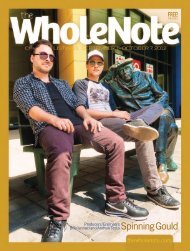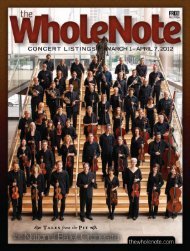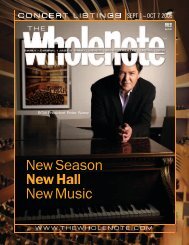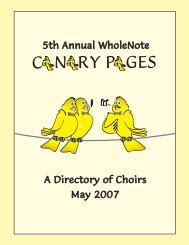You also want an ePaper? Increase the reach of your titles
YUMPU automatically turns print PDFs into web optimized ePapers that Google loves.
at the Cookery: The Music and Times of Alberta Hunter, for which she<br />
won a Dora Award, The Gospel According to the Blues, for which she<br />
won a Gemini, and Ain’t Misbehavin’, her first collaboration with Joe<br />
Sealy, who was the production’s music director.<br />
“I think that was in 1980,” Richardson recalls. “We closed the Ports<br />
Dinner Theatre, which was really unfortunate, ‘cause it was a real favourite<br />
place of mine. We did nine months at the Ports and three months at<br />
the Premier Dance Theatre.”<br />
“Was it that long?” asks Sealy. “It seemed like a month!”<br />
The Toronto jazz scene sure was different in those days, wasn’t it?<br />
“Ah yes, I moved to Toronto in 1976,” says Sealy. “At that time we had<br />
George’s Spaghetti House, Basin Street, Bourbon Street, the Colonial<br />
Tavern. One of the jazz clubs that opened in the late 1970s was called<br />
Yellow Fingers at Bay and Yorkville. And Meyer’s Deli in Yorkville had<br />
jazz on the weekends. Oh, and the Chick ‘n’ Deli of course!”<br />
“An institution, that place was,” says Richardson. She pauses, and<br />
slowly adds, “But the norm being six days a week, I mean, I can’t believe<br />
that that’s gone.”<br />
Sealy agrees, with sadness. “It was a real great training ground, I mean<br />
that’s how musicians learned to play, is doing it six nights a week. All<br />
my gigs up to that time were like that, I was totally used to playing six<br />
nights a week. Then it started to go down to weekends and then to nothing<br />
at all. Now you have private gigs and that’s it really. Back then when<br />
you got a gig it was a week or a month, but it was always six nights.”<br />
“One of the really great gigs that we had back then was at the Bellair<br />
Cafe,” Richardson says, adding with genuine enthusiasm, “It was two<br />
years, six days a week. It was AWESOME! You’d have players coming<br />
in from across the street — there was a club across the street that had<br />
big bands, big orchestras sometimes, once in a while Gladys Knight or<br />
people like that — but when they had the dance bands, it would be 20<br />
minutes on, ten minutes off. So the guys would walk in the door, and<br />
if we were playing, they’d start playing, walk up to the stage, do their<br />
little thing and walk out. We were a trio and we never knew how many<br />
people would be on the stage on any given night!”<br />
“That’s why I applaud Colin and Joan,” says Sealy, referring to the<br />
Hunters, who are set to open the Jazz Bistro, formerly the Top o’ The<br />
Senator. “They are trying to bring that back and they have a great shot<br />
of doing it because they are committed to the idea. I know I’ll get some<br />
work there, I’m not expecting six nights a week of course. I’m just glad<br />
that it will be there, so I’ll have some place to go. I mean, when the<br />
Montreal Bistro was open, and I had nothing to do, that’s where I would<br />
go. It was my second home. There’s no place like that now.”<br />
Which bring us to JPEC — the Jazz Performance and Education<br />
Centre — set to present Africville Stories as part of their fourth annual<br />
gala. Inspired by New York City’s Jazz at Lincoln Center, JPEC is a nonprofit<br />
charitable organization, the brainchild of Ray Koskie, a retired<br />
lawyer and Rochelle Koskie, a retired teacher, jazz enthusiasts and partners<br />
in crime together for over half a century.<br />
“Some of the musicians who we’ve known for years came to us and<br />
asked us if we could help them by trying to create some kind of a facility,<br />
which we decided to do on a strictly volunteer basis,” says Ray Koskie.<br />
“We put together a group — business people, musicians — and formulated<br />
a committee which began to consider various options, one of which<br />
included a trip to Jazz at Lincoln Center where we were given a tour,<br />
an explanation. Because that was based on a not-for-profit charitable<br />
organization, we thought that would be a better idea than opening a<br />
for-profit private club. That was the beginning.”<br />
“Our mandate includes reaching out to persons of all ages, especially<br />
children, who are our future audiences,” says Rochelle Koskie.<br />
“Our outreach program sends musicians to schools that have little or<br />
no music programming. Response has been excellent, and from the<br />
monies raised from the 2013 gala, we hope to broaden the number of<br />
schools in the program.” Find out more about JPEC and how you can<br />
get involved by visiting jazzcentre.ca.<br />
Back to Africville: Shifting the focus back to Sealy’s Africville<br />
Stories, in preparing for this story, I was able to locate a copy<br />
of the Africville Suite album (thank you, L’Atelier Grigorian!).<br />
Thelonious Monk said it best when he pointed out that “writing<br />
about music is like dancing about architecture,” so all I can say is that<br />
February 1 – March 7, 2013 thewholenote.com 9

















